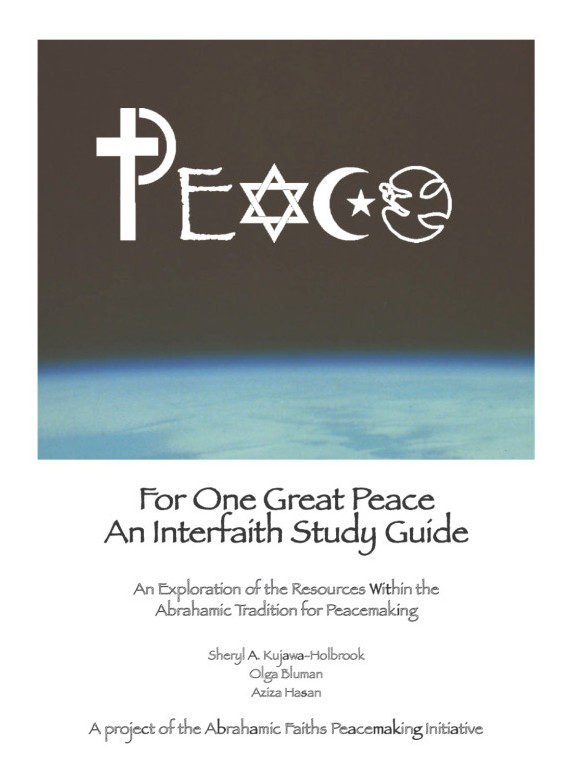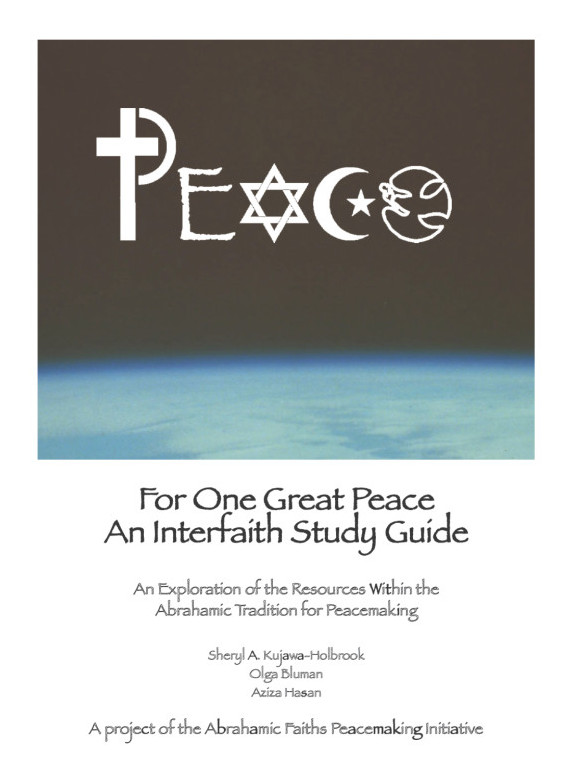Interfaith Curriculum for Peacemaking

This excellent resource enables participants to acquire basic skills in interfaith dialogue and to build bridges across religious and cultural differences. The 74-page curriculum is published by the Abrahamic Faiths Peace Initiative (California, USA) and authored by learned practitioners of three religious traditions. Three of the sessions focus on peacemaking in Judaism, Christianity, and Islam. Also included are guidelines for interfaith leaders, reflective exercises, background information sources, suggestions for further readings and excellent tips for practising interfaith hospitality. The curriculum is also an important resource for those who are not members of the Abrahamic faiths. This document is also available as a Kindle e-book (96 cents).
To view or download free of charge, click here: For One Great Peace, An Interfaith Study Guide
The Curriculum
Overall, the curriculum is comprised of this introduction, two introductory lessons on sharing stories and basic models of interfaith encounter, three lessons on each of three Abrahamic traditions and peacemaking, Judaism, Christianity and Islam, and a closing lesson. Sessions are designed to be one to three hours in length, depending on local custom. Lessons may be used individually or together and offer a choice of activities. Each lesson is designed to be self contained and leaders have a choice to utilize the whole curriculum or sections thereof. Although the materials are written with adult education audiences in mind, sections may be adapted for older youth when appropriate.
The stories of the Abrahamic Faiths Peacemaking Initiative (AFPI) are based in hope. As imperfect as the relationships between faith communities may be at times, we are confident that we have the capacity to grow together and to make deeper interfaith relationships possible. Lasting peace is possible only when all of God’s people are able to live in peace. The point has been made that building interfaith understanding will contribute to our local communities and our world. A point should also be made that encounters with other faiths give us a better appreciation of what life is like for members of other religious and cultural groups, as well as transferable skills that are applicable to a wide variety of situations and social contexts. The ability to listen and work and share compassionately with people who hold different views than ourselves is a valuable skill gained through interfaith dialogue that are also helpful when working through theological differences in intra-religious dialogue with members of our own faith traditions. Interfaith peacemaking cannot be limited to a religious “program.” Rather, it is integral to the well-being of all humankind. This vision encompasses both ethical practice as well as public policy-making in our local communities. It challenges faith communities to develop spiritual grounding for people that enables them to hold their own religious truths, while at the same time respecting the religious truths of their neighbors. Indeed, many faith communities already have more religious diversity in their midst than they recognize or celebrate. Through interfaith families, and through networks related to work and school, many people are already involved in interfaith dialogue on a daily basis.
Originally published by Scarboromissions.ca. Thank you for sharing!
For more interfaith curriculum resources, check out Scarboro Mission’s extensive list here!

